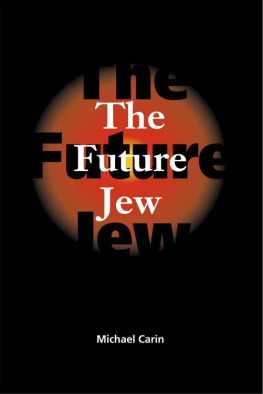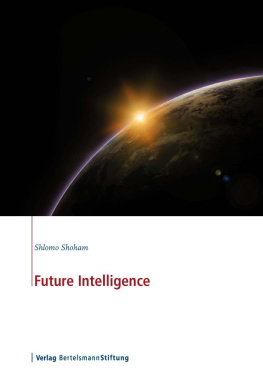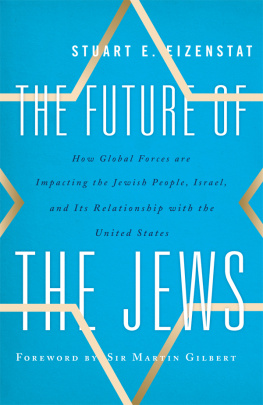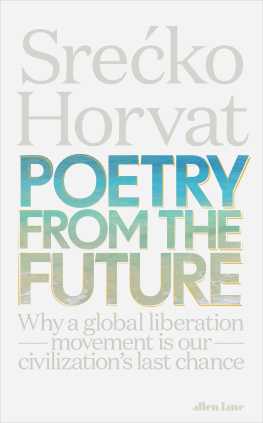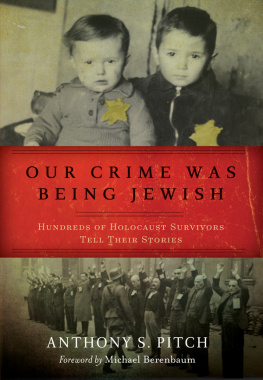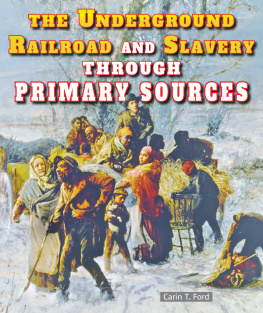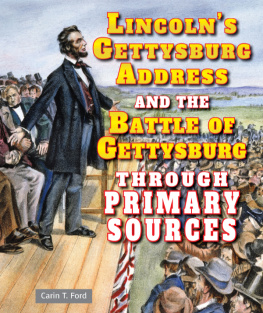The
Future
Jew
Michael Carin
MRW Press
Montreal
Copyright 2001 by Michael Carin
All rights reserved. Except for purposes of review, no part of this publication may be reproduced or transmitted in any form or by any means, or stored in a data base or retrieval system, without the prior written permission of the publisher.
Published in 2001 by
MRW Press
2500 Pierre-Dupuy Avenue, Suite 403
Montreal, Quebec, Canada H3C 4L1
The passage quoting Rabbi Sherwin T. Wine is reprinted from his book Judaism Beyond God (p. 98) with the permission of the Society for Humanistic Judaism, 1995, info@shj.org, www.shj.org.
NATIONAL LIBRARY OF CANADA CATALOGUING IN PUBLICATION DATA
Carin, Michael, 1951
The future Jew
Includes index
ISBN: 0-9688569-0-X
1. JewsHistory1945 . 2. Judaism20th century.
3. Holocaust, Jewish (1939-1945)Influence. I. Title
D804.348.C37 2001 909.049240825
C2001-902486-X
www.thefuturejew.com
Cover Design: Brian Turnbull
For Cielo
This book, principally a work of non-fiction, contains several passages of documentary fiction. The persons and events depicted, when not taken from fact, are nonetheless drawn from history.
Not only must we remember the stories that have been handed down. We are also obligated to imagine the stories that could never be told.
Holocaust Haggadah
Contents
Prologue
Book One The Resignation of Alexandra Levy
Book Two Indictment
Book Three Holocaust Haggadah
Book Four Deliberation
Book Five Resolution
Book Six Interview With a Future Rabbi
Epilogue
Index
If you will it, it is no dream.
Theodor Herzl
Prologue
T he industrialized mass murder of the European Jews at the hands of Nazi Germany left a colossal stain on the human story. As time goes on, however, that stain and its lessons are in danger of fading and being forgotten. A century from now, or in two centuries, how will the world recall the annihilated victims of the Holocaust? What will be the legacy of the six million?
The fact is, notwithstanding the heroic establishment of the state of Israel in 1948, the Jewish people have failed to ensure the perpetuation of the Holocaust in global memory. By shrinking from radical, fundamental, philosophical response, the Jews have thus far forsaken the six million.
Of course, laudably, for over fifty years the Jewish people have been lining the shelves of libraries with Holocaust memoirs, novels, albums, histories, and textbooks. Yes, spectacularly, Jews have turned the movie business into their kingdom and made innumerable documentaries, television programs and feature films about the Holocaust. And yes, solemnly and rightly, on every continent of the world the Jewish people have constructed, or caused to be constructed, poignant monuments and heart-rending museums.
But no, these fosterings of remembrance, as justified and praiseworthy as they may be, are not enough. The post-Holocaust Jews have demurred from the basic act, the principal expression, that would keep the flame of remembrance lit for eternal time. For example, responding to tradition, they have gone on dedicating two nights every year to the biblical triumph of the Exodus. In their liturgy, the ancient myth of deliverance from Egyptian captivity still takes precedence over the twentieth centurys stark reality of German genocide. Philosophically, the unamended constitution of Judaism continues to give thanks for the release from Pharoahs bondage while declining to account for the Fuehrers ovens.
As the centuries pass, the memorials to the six million that Jews have created in the form of books, movies, monuments and museums will remain only that: memorials , pointing to the receding past. Soon, in the ever-accelerating rush of history, the memorials themselves will begin to assume the aura and substance of artifacts. And then the forgetting will begin in earnest.
By the year 2100, few people other than specialized students and professors will carry authoritative knowledge of Nazi Germanys monstrous crime. By the year 2200, rare indeed will be the average person able to identify the significance of Auschwitz or the sinister import of the term Final Solution.
But this future amnesia may be deterred.
A remembering that can withstand the corrosion of time and endure for generation upon generation requires a vessel of steely purpose, equipped with a motor even more powerful than literature. In wake of the questions posed by the Holocaust the Jewish people must evolve an answering catalyst, a movement a mighty new myth that will render the loss of the six million an event that history will never be permitted to dim.
Said a wise woman, perhaps the most intellectually prolific woman who ever lived, Hannah Arendt: Think without banisters.
Precisely the prescription.
Book One
Of selves like our own. Each a flame of unrepeatable consciousness. Hopes, fears, dreams, just like ours. Flesh as our flesh: vital, hungry, questing and vulnerable. We can imagine their stories. Because they were us. And we are who they were.
Holocaust Haggadah
The Resignation of Alexandra Levy
M y Fellow Jews:
Welcome to the concluding session of our annual plenary. You have come to listen to a report that sums up the progress we have made over the past year. As your president, and by long established custom, it is my duty tonight to provide you with such a report. It is my duty as well to outline the tasks and goals that we have set for ourselves in the period ahead. For many decades, indeed for nearly a century, that is the kind of speech which your president has delivered at the final meeting of our yearly convention.
Ladies and gentlemen, that is the speech you have a right to expect, but it is not the speech that you are going to hear.
Please bear with me.
This Jew who stands before you, who has occupied the office of your president for seven years; who has travelled the world meeting Jews in every country where they reside; who has met on your behalf with scores of national leaders, and spoken in your name at countless international gatherings; who has, she sincerely trusts, served you with all the efficiency and dignity that you require from your leadership this Jew now asks for your attention. She asks for your patience and indulgence.
Please be assured that my conduct on this occasion, and the choice of words about to be spoken, are the result of the most profound meditation and careful deliberation.
The ideas that you will soon hear go to the very heart of what it means to be a Jew. My decision to advance them from this podium may strike you as incompatible with my role as your president. You will be right. The ideas that you are about to hear have nothing to do with the office to which you elected me. In addition, these ideas will represent a solemn contradiction of beliefs held sacred by a great majority in this hall. The ideas soon to be expressed may well inflame instant disfavor and even aversion among many of you. Accordingly, my letter of resignation, signed a little over one hour ago, has been put into the hands of our executive director. The resignation becomes effective immediately upon conclusion of this address. As you will realize shortly, no other path of action would be appropriate.
And now, with humility and a measure of apprehension, but with a certitude ratified by all of my intellectual honor and motivated by my self-respect as a person and as a Jew, let me tell you my story.
It begins with a book.
An old and long forgotten book. A book that was obscure even at the time of its publication in the middle of the last century, some years after the Second World War. The slim volume was chanced upon in an antiquarian bookshop and read on the eve of Passover during an airflight from Jerusalem to New York. The book tells the story of Avrum Kantowitz, a Polish Jew from the city of Lodz who was born in the year 1906. His father was a baker, as was his grandfather and his grandfathers father before him. Avrum too, after some years of rudimentary education in the local yeshiva, went into the family trade and took his place in the community. The book relates that he was a short man, stocky, and richly bearded. When agitated he would stutter; when delighted he would bellow with unaffected laughter. He had a temper, which on occasion erupted, but he was a decent, hardworking, amiable, good man. Throughout his life he wore a skullcap and tzitzit . He attended synagogue regularly, and observed the holy days faithfully. Far from being affluent or even moderately prosperous, he nevertheless contributed as best he could to those worse off than himself. Certainly he never brought harm to anyone on the earth.
Next page
